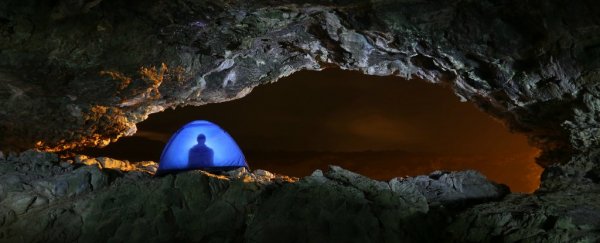Whenever we've tried to test the effects that living in isolation without sunlight have on the body, a common thread has emerged: much longer sleep cycles.
Back in 2015, Julie Beck over at The Atlantic pulled together the findings from a number of different experiments that all saw the participants involved drifting off for days at a time… and suffering some fairly acute mental stresses along the way too.
Take cave explorers Josie Laures and Antoine Senni, for example, who lived underground for months in the 1960s.
When they emerged from their self-imposed solitude (having stayed in separate caves), both thought much less time had passed than was actually the case, to the tune of several weeks.
What's more, Senni would sometimes sleep for stretches of 30 hours at a time, then wake up believing he'd just had a short nap.
Researchers on the surface kept in touch with the pair and monitored their vital statistics for any signs of deteriorating health, but they didn't offer any clues as to the passing of time or the cycle of days.
It would seem that without the rising and the setting of the Sun to guide us, our bodies lose track of just how many weeks and days are going by, and when we should be sleeping.
"I am so happy to have lasted it out, that I have forgotten everything," Josie Laures told the Associated Press at the time.
"I can tell you though that it became very difficult toward the end and I felt terribly worn out… At the start of my stay I read, and then I lost the desire. I didn't suffer from the cold. I was well heated in my little tent. My tape recorder refused to work the first few days, but later I managed to repair it and I listened to music. Outside of that I knitted, and knitted some more, and looked forward to the time when I would finally see the sun."
The experiment was seen as a window into how astronauts might hold up physically and mentally on long, lonely voyages into space, a concern that has recently been brought up again as NASA prepares to send a manned mission to Mars.
Sitting in a spaceship isn't quite like sitting in a cave, but there are similarities.
And it seems that when there's nothing else to do, we simply nod off for days at a time.
The Atlantic points to further research indicating humans will occasionally stretch out sleep cycles to 48 hours given the chance.
If we ever develop some kind of deep, cryogenic sleep system for sending astronauts to the far reaches of space, it looks like our bodies will provide a natural starting point.
Other similar experiments have found loneliness and mental tiredness to be the biggest problems when people are left with no one but themselves for company for months at a time (if you've ever seen Cast Away, you'll remember Tom Hanks making friends with a volleyball).
More studies of this nature are going to be required if we're to understand the toll that darkness and isolation take on the human psyche, but the experiments undertaken so far make for fascinating reading.
A version of this story was first published in November 2015.
